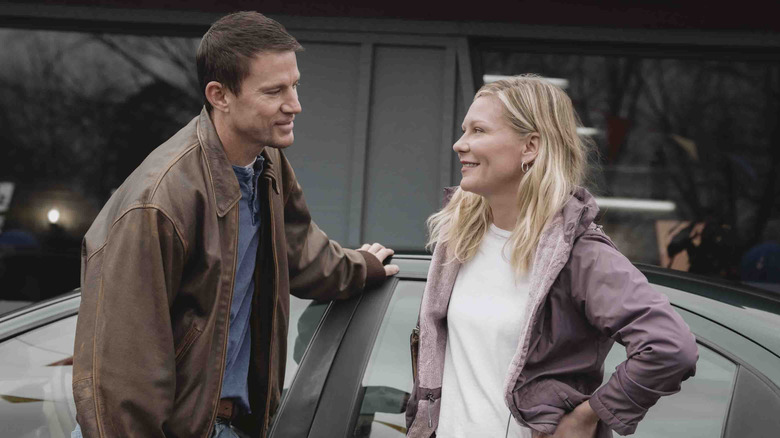Share this @internewscast.com
RATING : 8 / 10
- A wild true story that’s both funny and sad
- Perfect use of Channing Tatum and Kirsten Dunst
- A bit shallow where it could have gone deeper
Derek Cianfrance, acclaimed for heartfelt films like “Blue Valentine” and “The Place Beyond the Pines,” surprised audiences by venturing into comedy with “Roofman,” his first feature in eight years. However, viewers at the 2025 Toronto International Film Festival discovered that Cianfrance’s approach still leans heavily into his comfort zone. “Roofman” may be labeled a comedy, but it harbors an underlying sadness that intertwines seamlessly with its humor.
“Roofman” is based on the true story of Jeffrey Manchester, portrayed by Channing Tatum. Manchester, a struggling divorced veteran, is resourceful but also stuck in a cycle of bad luck. Unable to find employment, his knack for observation leads him to sneak into McDonald’s via their roofs to rob them, maintaining a courteous demeanor toward the staff. When imprisoned for 45 years, he escapes and takes refuge inside the walls of a Toys “R” Us, surviving on Peanut M&Ms and observing employees with baby monitors.
The plot thickens when Leeds employee Leigh Wainscott (Kirsten Dunst) is stymied by her supervisor Mitch’s (Peter Dinklage) reluctance to donate toys for a church charity. In response, Jeff, adopting the alias “John Zorn,” intervenes and forms a connection with the church community and Leigh, sparking an unexpected romantic subplot.
Tatum and Dunst are perfectly cast
In balancing comedy with fidelity to actual events, “Roofman” recalls Richard Linklater’s “Hit Man,” yet contrasts by sticking closer to reality. Humor stems from the inherent absurdity in Jeff’s real escapades, despite a few chronological and factual liberties—such as the anachronistic presence of “Naruto” hoodies in 2004. The casting of Tatum, whose real-life counterpart differs significantly in appearance, also adds comedic flair when the credits roll with real photos and videos.
Tatum’s performance as Jeff combines a mix of likable qualities: a competent soldier, a charming klutz, and a gentle dad whose sincerity is humorously mistaken for being gay. This role perfectly marries Tatum’s screen persona, providing moments of laughter, a bit of dancing, and a memorable nude scene that blends humor with intrigue. His portrayal captures Jeff’s inherent sadness, resonating with the audience.
A strong supporting cast, led by Kirsten Dunst as Leigh, enriches the storytelling. Dunst’s portrayal of the down-to-earth, single mom radiates charm and vulnerability, highlighting her character’s complex relationship with Jeff. Their dynamic hints at a desire for normalcy amid chaotic circumstances, but Jeff’s continuous material gifting complicates this. While his actions aim to fill an emotional void left by his estranged daughter, they ultimately place him at risk. Viewers may debate the morality of Jeff’s actions within the context of his circumstances, distinguishing between needed survival tactics and unnecessary criminal exuberance.
More a character study than a social critique
Where “Roofman” could have gone further is in interrogating the culture that makes it so difficult for people in Jeff’s situation to make an honest living while also encouraging the sort of greed and materialism that leads to dishonest livings. The opening exposition explaining how Jeff fell into crime is arguably critique enough for what the film wants to accomplish, and given Jeff’s choices are so unique, it’s understandable why the emphasis of the film’s moralistic final act is more on his own choices and personal responsibility rather than broader systemic factors. Even so, it feels like more of that systemic critique could have been the thing that boosted this from merely a good film to a great one.
To compare with another film I saw this year at the Toronto International Film Festival, “No Other Choice” (directed by Park Chan-wook, the man behind the cult classic “Oldboy”) is another tragicomic crime movie about a financially struggling man enacting baffling schemes to support his family. “No Other Choice” goes from merely amusing to astonishing is with its ending, which situates its antihero’s ironic moral karma inside a poetically rage-inducing condemnation of the forces that create such criminals in the first place. This isn’t the fairest direct comparison since “No Other Choice” is pure fiction where “Roofman” is striving for historical accuracy, but it’s still easy to imagine how “Roofman” could have gone bigger picture. Toys “R” Us, after all, no longer exists as it did in the 2000s because of thieves much more dangerous and facing far fewer consequences than the Roofman.
“Roofman” premiered at the 2025 Toronto International Film Festival. It opens in theaters on October 10.
![Channing Tatum Charms In Bittersweet True Crime Story [TIFF 2025]](https://internewscast.com/wp-content/uploads/2025/09/Channing-Tatum-Charms-In-Bittersweet-True-Crime-Story-TIFF-2025-800x430.jpg)









